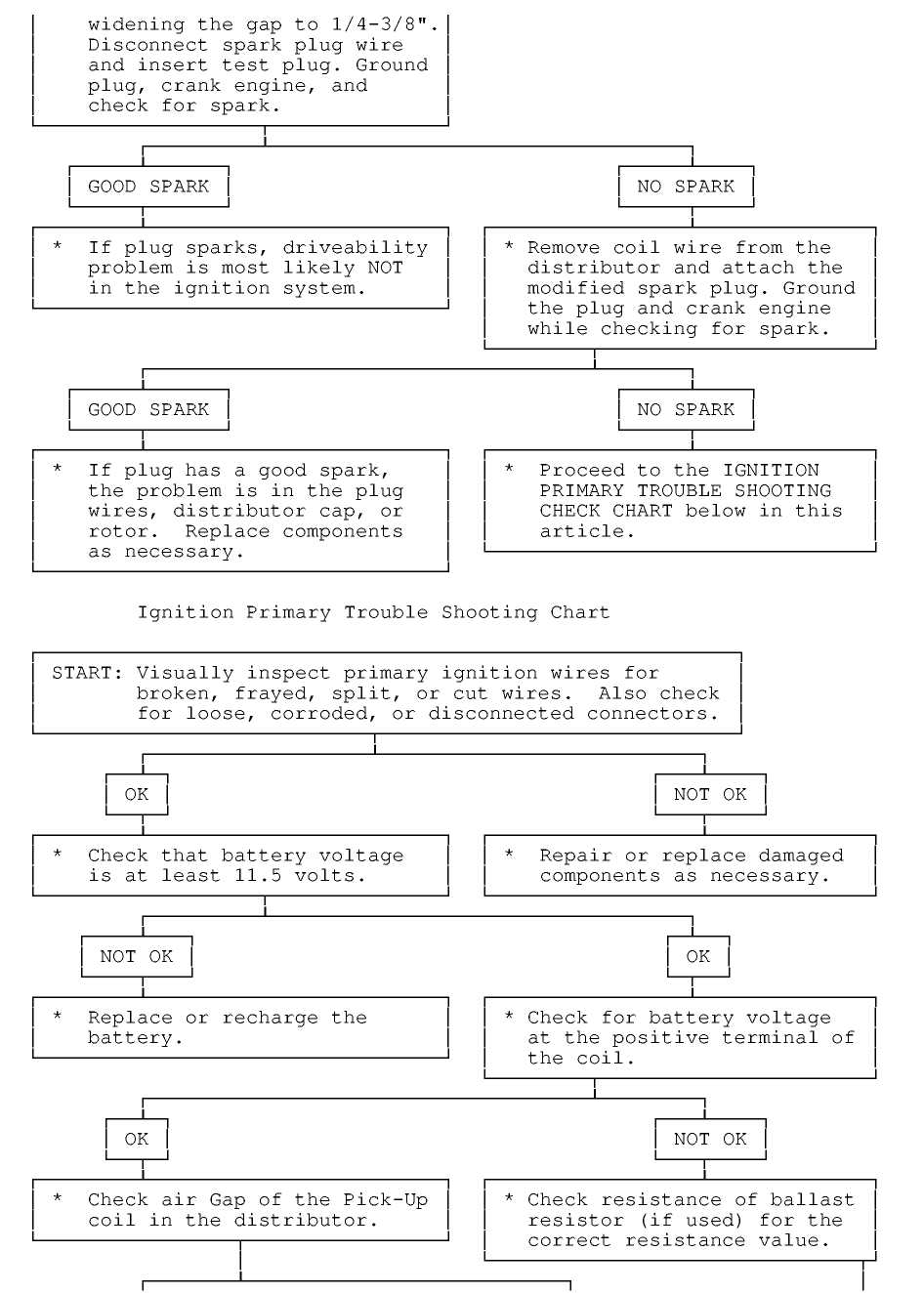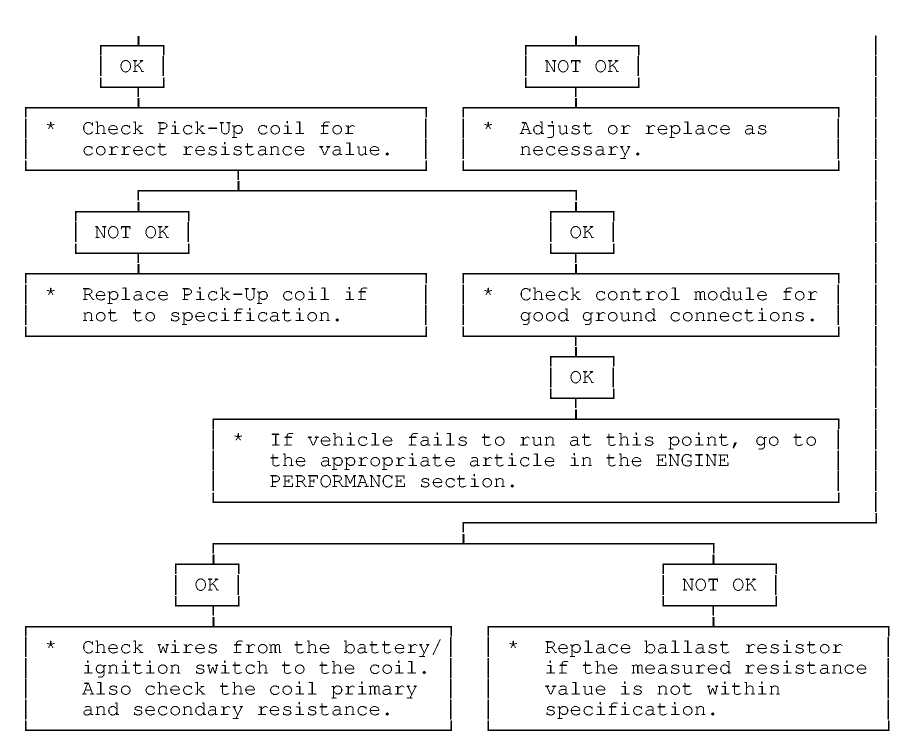TROUBLE SHOOTING - BASIC PROCEDURES
1988 Jeep Cherokee
GENERAL TROUBLE SHOOTING
* PLEASE READ THIS FIRST *
NOTE: This is GENERAL information. This article is not intended
to be specific to any unique situation or individual vehicle configuration. The purpose of this Trouble Shooting information is to provide a list of common causes to problem symptoms. For model-specific Trouble Shooting, refer to SUBJECT, DIAGNOSTIC, or TESTING articles available in the section(s) you are accessing.
ACCESSORIES & ELECTRICAL
CHARGING SYSTEM TROUBLE SHOOTING
NOTE: This is GENERAL information. This article is not intended
to be specific to any unique situation or individual vehicle configuration. The purpose of this Trouble Shooting information is to provide a list of common causes to problem symptoms. For model-specific Trouble Shooting, refer to SUBJECT, DIAGNOSTIC, or TESTING articles available in the section(s) you are accessing.
BASIC CHARGING SYSTEM TROUBLE SHOOTING CHART
CONDITION
POSSIBLE CAUSE CORRECTION
Vehicle
Will Not Dead battery Check battery cells,
Start alternator belt
tension and alternator output
Loose or corroded battery Check all
charging
connections system connections
Ignition circuit or switch Check and replace
as
malfunction necessary
Alternator
Light Loose or worn alternator Check alternator drive
Stays On With drive belt tension and
Engine Running condition, See Belt
Adjustment in TUNE-UP article in the TUNE-UP section
Loose alternator wiring Check all
charging
connections system connections
Short in alternator light See Indicator
Warning
wiring Lights in STANDARD
INSTRUMENTS in the ACCESSORIES & EQUIPMENT section
Defective alternator stator See Bench Tests
in
or diodes ALTERNATOR article
Defective regulator See Regulator Check in
ALTERNATOR article
Alternator
Blown fuse See WIRING DIAGRAMS
Light Stays Off With Ignition Switch ON
Defective alternator See Testing in
ALTERNATOR article
Defective indicator light See Indicator
Warning
bulb or socket Lights in STANDARD
INSTRUMENTS in the ACCESSORIES & EQUIPMENT section
Alternator
Short in alternator wiring See On-Vehicle Tests
Light
Stays OFF in ALTERNATOR article
With Ignition Switch ON
Defective rectifier bridge See Bench Tests in
ALTERNATOR article
Lights
or Fuses Defective alternator wiring See On-Vehicle Tests
Burn
Out in ALTERNATOR article
Frequently
Defective regulator See Regulator Check in
ALTERNATOR article
Defective battery Check and replace as
necessary
Ammeter
Gauge Loose or worn drive belt Check alternator drive
Shows
Discharge belt tension and
condition. See Belt Adjustment in TUNE-UP article in the TUNE-UP section
Defective wiring Check all wires and
wire connections
Defective alternator or See Bench Tests
and
regulator On-Vehicle Tests in
ALTERNATOR article
Defective ammeter, or
See Testing in
improper ammeter wiring
STANDARD INSTRUMENTS
connection in
the ACCESSORIES &
EQUIPMENT section
Noisy Loose
drive pulley Tighten drive pulley
Alternator attaching nut
Loose mounting bolts Tighten all alternator
mounting bolts
Worn or dirty bearings See Bearing
Replacement ALTERNATOR article
Defective diodes or stator See Bench Test in
ALTERNATOR article
Battery
Does Loose or worn drive belt Check alternator drive
Stay
Charged belt tension and
condition. See Belt Adjustment in appropriate TUNE-UP article in the TUNE-UP section
Loose or corroded battery Check all
charging
connections system connections
Loose alternator connections Check all charging
system connections
Defective alternator or See On-Vehicle
Tests
battery and Bench Tests in
ALTERNATOR article
Add-on electrical accessories Install larger exceeding alternator capacity alternator
Battery Defective
battery Check alternator
Overcharged- output and repair as
Uses Too Much necessary
Water
Defective alternator See On-Vehicle Test and
Bench Tests in ALTERNATOR article
Excessive alternator voltage Check alternator output
and repair as necessary
IGNITION SYSTEM TROUBLE SHOOTING
NOTE: This is GENERAL information. This article is not intended
to be specific to any unique situation or individual vehicle configuration. The purpose of this Trouble Shooting information is to provide a list of common causes to problem symptoms. For model-specific Trouble Shooting, refer to SUBJECT, DIAGNOSTIC, or TESTING articles available in the section(s) you are accessing.
Ignition Secondary Trouble Shooting Chart



STARTER TROUBLE SHOOTING
NOTE: This is GENERAL information. This article is not intended
to be specific to any unique situation or individual vehicle configuration. The purpose of this Trouble Shooting information is to provide a list of common causes to problem symptoms. For model-specific Trouble Shooting, refer to SUBJECT, DIAGNOSTIC, or TESTING articles available in the section(s) you are accessing.
BASIC STARTER TROUBLE SHOOTING CHART
CONDITION POSSIBLE
CAUSE CORRECTION
Starter
Fails Dead battery or bad Check battery charge
to Operate connections between and all wires and
starter and battery connections to starter
Ignition switch faulty Adjust or replace
or misadjusted ignition switch
Open circuit between Check and repair wires
starter switch ignition and connections as
terminal on starter relay necessary
Starter relay or starter See Testing in STARTER defective article
Open solenoid pull-in See Testing in STARTER wire article
Starter
Does Not Weak battery or dead Charge or replace
Operate and
cell battery as necessary
Headlights Dim
Loose or corroded battery Check that
battery
connections connections are clean
and tight
Internal ground in See Testing in
STARTER
starter windings article
Grounded starter fields See Testing in STARTERS
Armature rubbing on pole See STARTER article shoes
Starter
Turns Starter clutch slipping See STARTER article but Engine
Does Not Rotate
Broken clutch housing See STARTER article
Pinion shaft rusted or See STARTER article dry
Engine basic timing See Ignition Timing
in
incorrect TUNE-UP article
Broken teeth on engine Replace flywheel
and
flywheel check for starter pinion
gear damage
Starter Will Not Faulty overrunning See STARTER article Crank Engine clutch
Broken clutch housing See STARTER article
Broken flywheel teeth Replace flywheel and
check for starter pinion gear damage
Armature shaft sheared See STARTER article
or reduction gear teeth
stripped
Weak battery Charge or replace
battery as necessary
Faulty solenoid See On-Vehicle Tests in
STARTER article
Poor grounds Check all ground
connections for tight and clean connections
Ignition switch faulty Adjust or replace
or
misadjusted ignition switch as
necessary
Starter Cranks Battery weak or Charge or replace
Engine Slowly defective battery as necessary
Engine overheated See ENGINE COOLING
SYSTEM article
Engine oil too heavy Check that proper
viscosity oil is used
Poor battery-to-starter Check that
all
connections between
battery and starter are clean and tight
Current draw too low or See Bench Tests
in
too high STARTER article
Bent armature, loose pole See STARTER article
shoes screws or worn
bearings
Burned solenoid contacts Replace
solenoid
Faulty starter Replace starter
Starter
Engages Engine timing too far See Ignition Timing in
Engine
Only advanced TUNE-UP article
Momentarily
Overrunning clutch not Replace
overrunning
engaging properly clutch. See STARTER
article
Broken starter clutch See STARTER article
Broken teeth on engine Replace flywheel
and
flywheel check starter pinion
gear for damage
Weak drive assembly See STARTER article thrust spring
Weak hold-in coil See Bench Tests in
STARTER article
Starter
Drive Defective point assembly See Testing in STARTER
Will
Not Engage article
Poor point assembly ground See Testing in STARTER
article
Defective pull-in coil Replace starter
solenoid
Starter
Relay Dead battery Charge or replace
Does Not Close battery as necessary
Faulty wiring Check all wiring and
connections leading to relay
Neutral safety switch Replace neutral
safety
faulty switch
Starter relay faulty Replace starter relay
Starter
Drive Starter motor loose on Tighten starter
Will Not mountings attach bolts
Disengage
Worn drive end bushing See STARTER article
Damaged engine flywheel Replace flywheel
and
teeth starter pinion gear for
damage
Drive yolk return spring Replace return spring broken or missing
Faulty ignition switch Replace ignition switch
Insufficient clearance Replace starter between winding leads to solenoid solenoid terminal and main contact in solenoid
Starter clutch not Replace starter clutch disengaging
Ignition starter switch Replace ignition switch contacts sticking
Starter
Relay Faulty solenoid switch, Check all wiring
Operates
but switch connections or between relay and
Solenoid
Does Not solenoid or replace
relay or solenoid as necessary
Broken lead or loose Repair wire or wire soldered connections connections as
necessary
Solenoid
Plunger Weak battery Charge or replace
Vibrates When battery as necessary
Switch is
Engaged
Solenoid contacts Clean contacts or
corroded replace solenoid
Faulty wiring Check all wiring
leading to solenoid
Broken connections inside Repair connections
or
switch cover replace solenoid
Open hold-in wire Replace solenoid
Low
Current Draw Worn brushes or weak Replace brushes or
brush springs as necessary
High
Pitched Whine Distance too great Align starter or check
During Cranking between starter that correct starter
Before Engine pinion and flywheel and flywheel are being
Fires but Engine used
Fires and
Cranks
Normally
High
Pitched Distance too small between Whine After Engine starter
pinion and flywheel
Fires With Key Flywheel runout contributes released. Engine to the intermittent nature Fires and Cranks Normally